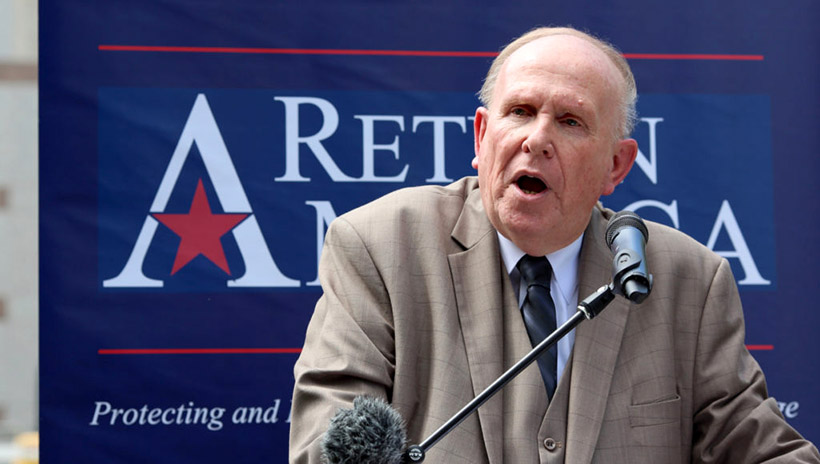Publisher's note: This post appears here courtesy of the Carolina Journal, and written by Lindsay Marchello.
The Rev. Dr. Ron Baity, president of Return America, speaks outside the Legislative Building, May 14, 2020. | Photo: Don Carrington/Carolina Journal
A collection of churches filed a federal lawsuit Thursday, May 14, challenging Gov. Roy Cooper's executive order banning mass gatherings, a move that has severely limited indoor worship services.
Hundreds of people gathered in downtown Raleigh for a rally demanding churches be allowed to operate similar to big-box retailers.
Ron Baity, president of
Return America, a nonprofit religious organization, led the rally. He was joined by several House Republicans, including Reps. Michael Speciale, R-Craven; Larry Pittman, R-Cabarrus; Jeffrey McNeely, R-Iredell; Steve Jarvis, R-Davidson; Keith Kidwell, R-Beaufort; Larry Potts, R-Davidson, Rep. Phil Shepard, R-Onslow, and Jerry Carter, R-Rockingham.
The lawsuit comes as legislative Republicans have criticized Cooper over how his executive orders have affected
religious activities. Under his most recent order, mass gatherings of more than 10 people are prohibited, including most indoor church services. Churches can hold services outside so long as social distancing is practiced. For funerals, no more than 50 people are allowed inside a church.
The order is an example of content-based restriction on the free exercise of religion, and it's unconstitutional, Senate Republicans say in a news release.
Churches should be allowed to enjoy the same freedoms that the business world is enjoying, Baity told rally-goers.
"Just because we're in a pandemic doesn't mean the First Amendment is suspended," Baity said.
If churches are allowed to reopen they will take care of their parishioners and keep them safe, Baity said.
Of the hundreds who attended the rally, few wore masks or practiced social distancing.
Dr. David Gibbs Jr., a lawyer with the Christian Law Association, is representing the group in the lawsuit.
"We are asking the court to instruct the governor to reopen the churches," Gibbs said.
There's no guarantee the courts will strike down the executive order even if it incidentally affects religious activity, said
Jon Guze, director of legal studies at the John Locke Foundation.
"It is only laws that selectively burden religious practice that are subject to strict judicial scrutiny," Guze said.
Constitutional claims are likely to do better in state court than federal, Guze said.
"On its face, at least, the N.C. Constitution does a much better job of protecting religious liberty from infringement by North Carolina's state government than does the U.S. Constitution," Guze said.
State courts have done a better job than federal courts in protecting citizens from unconstitutional laws and administrative orders, but ultimately which jurisdiction a lawsuit is filled in matters less than which judges get assigned the case, Guze said.
"Judicial doctrine regarding constitutional adjudication is highly deferential in both systems," Guze said.
"Which means courts in both systems can usually find a way to uphold laws and administrative orders if they want to."
Meanwhile, some hair stylists are threatening to sue Cooper to get their jobs back.
The COVID-19 executive orders shut down several businesses as the state sought to slow the spread in North Carolina. More than a million unemployment claims have been filed in North Carolina.
North Carolina entered Phase One of reopening May 8, but hair salons and barbershops still can't open, according to Cooper's order.
Chuck Kitchen and Karlene Turrentine, lawyers representing the
Hair is Essential Association and beauty salons, sent a letter to Cooper on Wednesday demanding the governor allow hair salons to open by noon May 18 or face legal action.
"The people holding these jobs do not make the kind of money where they can afford to be unemployed for two months," the letter reads.
Cooper's executive orders violate the "fruits of their own labor" clause in the state constitution, the lawyers said. The provision says resident s have the right to prosper from their own work. By forcing businesses to close, the executive orders run afoul of the clause, the lawyers said.
"People have the inalienable right to earn a living. Neither you nor the State have the right to preclude citizens using their own means from pursuing their chosen vocation," the letter reads.
"The preservation of this right is the principal reason for the Constitution itself."
Senate Leader Phil Berger, R-Rockingham
has called on Cooper to grant counties the flexibility in deciding whether hair salons, barber shops, and
restaurants should be allowed to reopen.
Twenty-five states have reopened hair salons or barber shops in some capacity, Berger said, and twenty-three states have reopened restaurants with safety guidelines in place.























